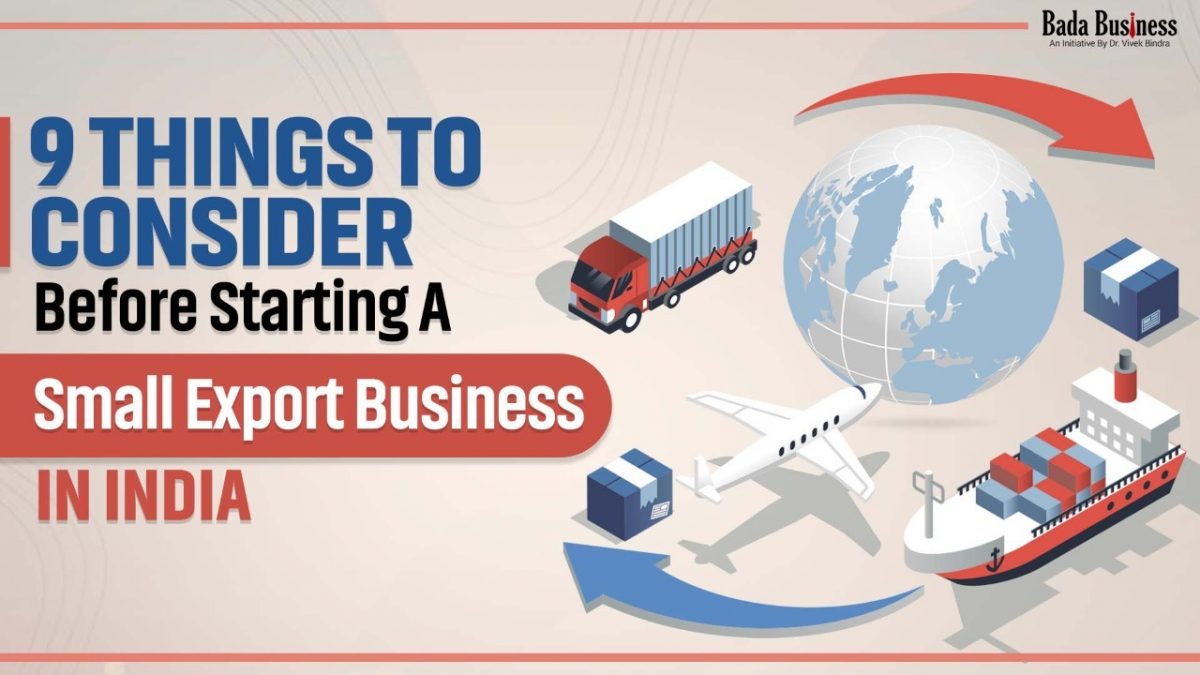Exporting a wide range of goods and services, India is the 14th largest exporter in the world. According to a recent report by HSBC, India is set to become one of the top 5 exporters in the world by the year 2030. As the country has embraced the concept of ‘Make in India’, exports from India are set to take a speedy course and will contribute to the GDP of the country.
The government of India has always been a great supporter of exports, but the pandemic has opened a new opportunity for aspiring small business owners who wish to start their ventures in small towns. The widespread use of the internet has also helped the export and import business to flourish.
If you are planning to start your own export business in India, you can attend our Free Masterclass by Dr. Ajay Sahai, Director General & CEO, FIEO. You can download the Bada Business Community APP to attend the class on February 22nd, 2022, Tuesday at 6:00 PM.
Here are nine things you must know if you are thinking about starting an export business:
1. Select Product
If you have already thought about the item you want to import-export then it is okay. Otherwise, some products are prohibited from being exported. So, ensure that your product is not one among them. India is known for mainly exporting agricultural products. You can also select a product in your area and export them by keeping the quality of the product into consideration. It is an important factor in receiving future orders and reviews from customers.
2. Analyze your Target Market
It is very important to understand your target audience when thinking about selecting an export business. Research the market size, quality requirements, competition, payment terms, etc. when you select an overseas market.
You can also enquire about a few export benefits available in the market for a few countries under the Foreign Trade Policy. Export promotion agencies, Indian Missions abroad, and your acquaintances can prove helpful in recognizing the initial market, as well as, expanding it.
3. Select Business Name & Logo
Before you decide to register and look for buyers for your products, you should select a name and logo for your business. You need to think about your business`s name so that you can register it.
4. Registration
Like any legitimate business run in India, you will need to get registered. It could be registered as a sole proprietorship, in partnership, private limited company, or LLP. Hire a lawyer for any legal advice and to help you with the legal proceedings of registering the business.
5. PAN
Businesses must obtain PAN (Permanent Account Number) from the Income Tax Department.
6. Bank Account
Open a current account at any commercial bank that is authorized to deal in Foreign Exchange.
7. Obtain Importer
Exporter Code (IEC) Number An exporter/importer in India is required to obtain an IEC number as per Foreign Trade Policy. It is a key business identification number that can be applied for online at www.dgft.gov.in. After the introduction of GST (goods and service tax), the IEC number is the same as the PAN of the firm.
8. Obtaining RCMC
RCMC (Registration Cum Membership Certificate) is a membership certificate issued for 5 years by Export Promotional Councils (EPCs) or Commodity Boards of India. It is proof that your business has been registered with the council/board and is useful when applying for any benefit or concession under Foreign Trade Policy like duty drawback, duty credit scripts, etc.
9. Get covered through ECGC
Dealing with an overseas client involves risks from the insolvency of the buyer/country. These payment risks can be covered by ECGC Limited (Formerly Export Credit Guarantee Corporation of India Ltd), a company wholly owned by the Government of India which provides export credit insurance support to Indian exporters under the Ministry of Commerce.
To get in-depth knowledge and information, attend our Masterclass on the Bada Business community app for free.
The idea of managing the business is easier said than done and we completely agree with you. This is why to help you move forward with your business goals, we at Bada Business offer courses like Problem Solving Courses (PSC) & Leadership Funnel Program (LFP Bada Business).

